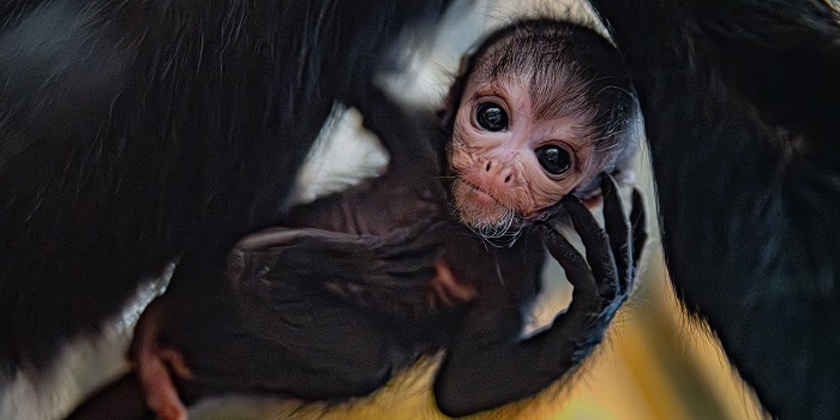First glimpse of rare newborn spider monkey at Chester Zoo

A rare primate – known for its spider-like appearance – has been born at Chester Zoo.
The baby Colombian black-headed spider monkey was spotted by zoo visitors while being cradled in the arms of new mum, Kiara.
Zookeepers have revealed the precious newcomer is female and have named her, Olive.
The highly threatened primate is vulnerable to extinction in the wild, with more than 80 per cent of its population having been lost in the last half a century.
The world’s authority on the state of nature, The International Union for the Conservation of Nature (IUCN), has listed the species as vulnerable – meaning it sadly faces a high risk of becoming extinct in the wild.
This species spider monkey is found mainly in Colombia and Panama in South America where it faces threats from hunting and the illegal wildlife trade.
The ongoing destruction of their rainforest home, driven mainly by agriculture, has caused severe habitat fragmentation and the species now requires urgent attention to help safeguard their future.
Primatologists at the zoo are responsible for managing the co-ordinated efforts between European zoos that are working to boost numbers and safeguard the charismatic monkeys from disappearing altogether.

Mark Brayshaw, Head of Mammals at the conservation zoo, said: “Life as a baby spider monkey is very bumpy as these fascinating primates are incredibly agile, spending the majority of their time leaping between the treetops and using their tails to hang upside down while foraging for food.
“It’s fantastic to see Kiara cradling baby Olive closely and being so attentive.
“Olive will cling to mum’s belly for a few months, before gaining enough confidence to start branching off on her own and start exploring independently – which will be great to see.
“Spider monkeys face huge survival challenges in the wild.
“In welcoming new life into the conservation breeding programme, we’re contributing to global efforts to secure a future for these highly endangered primates.
“In tandem with offering education, carrying out scientific research and improving public awareness, we hope to play our part in reversing their decline and ensuring the species thrives long into the future.”
To gain a wider understanding of the rare primates, numerous conservationists and researchers have studied the spider monkey group at Chester Zoo and their social structure.
These studies have developed methods for recording behavioural data which have then been transferred and applied to vital conservation action in the wild.
The species gets its name from its spider-like appearance thanks to their long, narrow limbs, long tails and black fur.
Their prehensile tails are often longer than their bodies, acting as an extra limb that wraps around branches and allows them to move freely while collecting food with their hands.
Spotted something? Got a story? Email: [email protected]
Latest News
